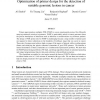Free Online Productivity Tools
i2Speak
i2Symbol
i2OCR
iTex2Img
iWeb2Print
iWeb2Shot
i2Type
iPdf2Split
iPdf2Merge
i2Bopomofo
i2Arabic
i2Style
i2Image
i2PDF
iLatex2Rtf
Sci2ools
BIOINFORMATICS
2007
2007
Optimization of primer design for the detection of variable genomic lesions in cancer
Primer approximation multiplex PCR (PAMP) is a new experimental protocol for efficiently assaying structural variation in genomes. PAMP is particularly suited to cancer genomes where the precise breakpoints of alterations such as deletions or translocations vary between patients. The design of PCR primer sets for PAMP is challenging because a large number of primer pairs are required to detect alterations in the hundreds of kilobases range that can occur in cancer. These sets of primers must achieve high coverage of the region of interest, while avoiding primer dimers and satisfying the physico-chemical constraints of good PCR primers. We describe a natural formulation of these constraints as a combinatorial optimization problem. We show that the PAMP primer design problem is NP-hard, and design algorithms based on simulated annealing and integer programming, that provide good solutions to this problem in practice. The algorithms are applied to a test region around the known CDKN2A d...
| Added | 08 Dec 2010 |
| Updated | 08 Dec 2010 |
| Type | Journal |
| Year | 2007 |
| Where | BIOINFORMATICS |
| Authors | Ali Bashir, Yu-Tsueng Liu, Benjamin J. Raphael, Dennis Carson, Vineet Bafna |
Comments (0)

